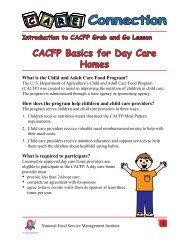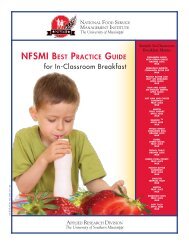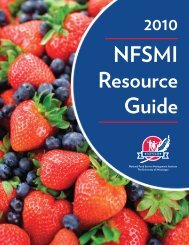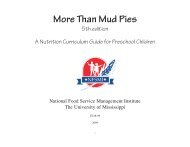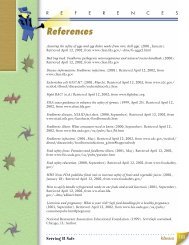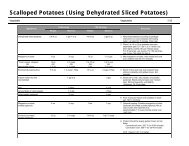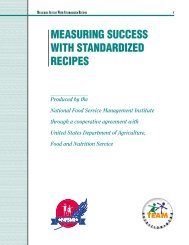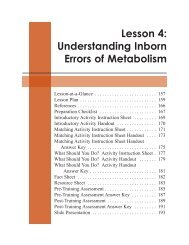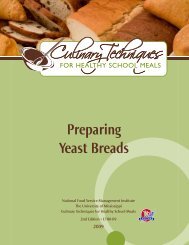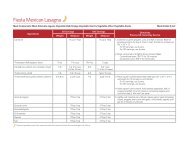financial management information system - National Food Service ...
financial management information system - National Food Service ...
financial management information system - National Food Service ...
You also want an ePaper? Increase the reach of your titles
YUMPU automatically turns print PDFs into web optimized ePapers that Google loves.
I NTRODUCTIONFINANCIAL MANAGEMENT INFORMATIONSYSTEM DEVELOPMENT PROCESSThe Applied Research Division (ARD) of the <strong>National</strong> <strong>Food</strong> <strong>Service</strong> Management Institute (NFSMI) convened a ResearchAgenda Task Force in the summer of 1995 to determine the research needs of school foodservice programs. The ResearchAgenda Task Force identified <strong>financial</strong> <strong>management</strong> as a primary concern and planned research activities to address thisissue. The first project was a case study to determine revenue generation and expenditure control measures used in<strong>financial</strong>ly successful school foodservice programs (Cater & Mann, 1997). This study demonstrated that even <strong>financial</strong>lysuccessful programs were analyzing expenditures inconsistently enough to prevent constructive comparisons amongprograms. The four school foodservice administrators participating in the study welcomed suggestions for uniformcalculations and eventually adopted these suggestions in their routine <strong>financial</strong> procedures.A second initiative was to survey state directors of school foodservice programs to investigate their perception of theusefulness of a uniform <strong>system</strong> for recording and analyzing <strong>financial</strong> data and to catalog the methods used to calculatecommon <strong>financial</strong> measures. The state directors responding indicated that a <strong>system</strong> for recording and analyzing <strong>financial</strong>data would be a helpful tool for better decision making. Cost control and effective <strong>financial</strong> <strong>management</strong> of schoolfoodservice resources were concerns cited by all respondents.Utilizing the survey results, a 25-member task force composed of state directors, district school foodservice administrators,school business officials, an accountant, and a computer software designer determined the scope, content, and format for auniform <strong>financial</strong> <strong>management</strong> <strong>information</strong> <strong>system</strong> (FMIS). The meeting took place in the spring of 1998. The FinancialAccounting for Local and State School Systems, 1990 handbook published by the <strong>National</strong> Center for Education Statistics servedas a guide in the development of the model. The model developed was evaluated and revised following a second task forcemeeting. Next, the FMIS was mailed to approximately 70 panelists representing all 50 states. The ARD staff analyzedcomments received from respondents and made further revisions based on this nationwide panel review. A validation of theforms and schedules contained in the model and a test of the process was conducted and final revisions were made. TheFMIS was published as a draft in 1999 and as a technical report in February 2001.Changes in <strong>financial</strong> <strong>management</strong> practices after the initial task force meeting set the stage for updating the FMIS model in2004. NFSMI convened a new 20-member <strong>financial</strong> <strong>management</strong> task force on March 22-23, 2004 to recommendchanges/modifications to the 2001 FMIS model. The process for updating the model included a review of the existingmodel as well as comparison with the latest version of Financial Accounting for Local and State School Systems, 2003 Edition.Results from the 2004 task force meeting confirmed that the NFSMI FMIS model should be updated to address current<strong>financial</strong> <strong>management</strong> issues and practices in school meal programs. Participants most often mentioned issues such asvending practices, single inventory of purchased and commodity foods, food pricing, and development of benchmarks asconcerns that should be addressed in an updated version of the FMIS model.Using the task force recommendations, the NFSMI staff revised the 2001 FMIS model. An expert panel reviewed the draftof the updated version. Further refinements were made to reflect the panel’s suggestions and recommendation. Thispublication represents the combined efforts of both the 1998 and 2004 task forces and expert panel members.N ATIONAL F OOD S ERVICE M ANAGEMENT I NSTITUTE 8



